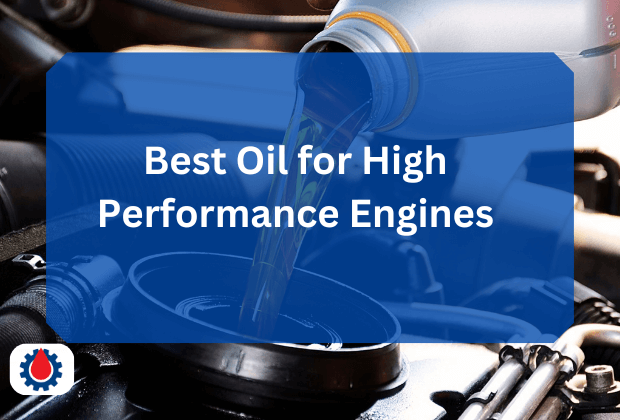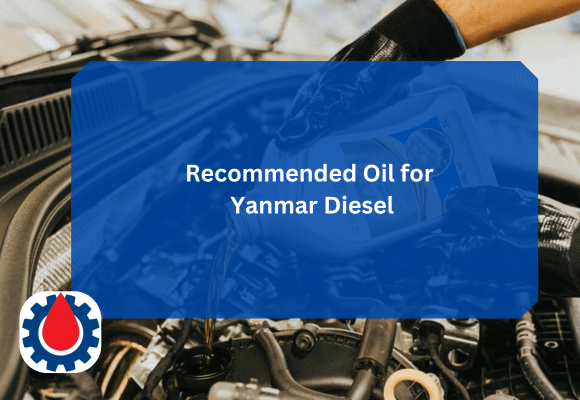High-performance engines demand more than just regular maintenance, they require premium lubrication that can handle extreme conditions, high RPMs, and elevated temperatures.
In this guide, we’ll explore what makes a great oil for high-performance
engines and review five of the top-rated options currently available.
These oils are chosen based on formulation, viscosity stability, additive packages, and customer satisfaction.
Best Oil for High Performance Engines
1. Mobil 1 Extended Performance Full Synthetic 5W-30
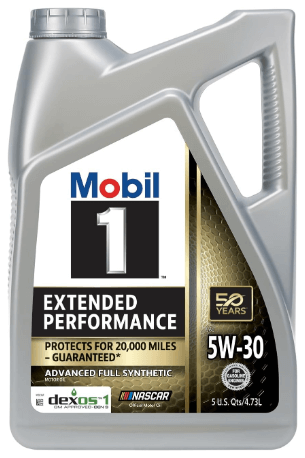
Mobil 1 is a household name in synthetic engine oils, and its Extended Performance variant is engineered for high-performance engines under extreme stress.
Features:
- Designed for up to 20,000 miles of guaranteed protection.
- Outstanding thermal and oxidation stability.
- Superior wear protection at high RPMs and engine loads.
- Excellent low-temperature performance for quick cold starts.
- Trusted by leading automakers and used in factory fills.
2. Royal Purple High Performance Street Synthetic Motor Oil 5W-30
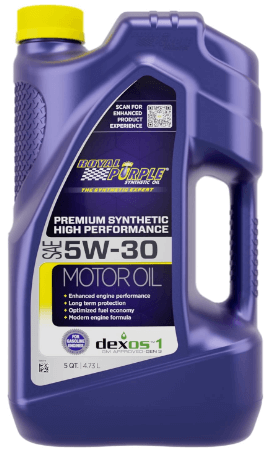
Royal Purple blends high-grade base oils with advanced additive technology, ideal for high-performance street and track cars.
Features:
- Synerlec® additive technology provides a strong oil film for enhanced protection.
- Increases horsepower and torque by reducing friction.
- Improves fuel economy while maintaining viscosity.
- Excellent corrosion protection for long-term engine durability.
- Compatible with ethanol-based fuels and other synthetics.
3. Valvoline Advanced Full Synthetic SAE 5W-30 Motor Oil
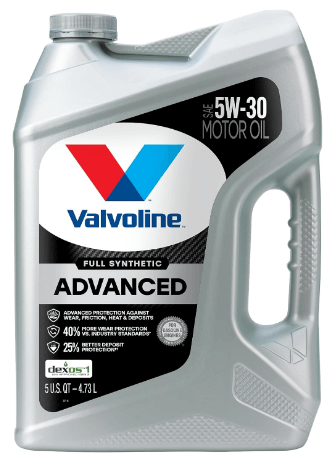
Valvoline’s advanced formula is built for extreme conditions, providing excellent protection in both turbocharged and naturally aspirated engines.
Features:
- Formulated with anti-wear additives for superior protection.
- High oxidation resistance helps prevent oil breakdown.
- Excellent sludge and varnish control for cleaner internals.
- Advanced synthetic base oils resist thermal degradation.
- Enhanced for engines with direct injection and turbos.
4. Castrol EDGE Advanced Full Synthetic 5W-30
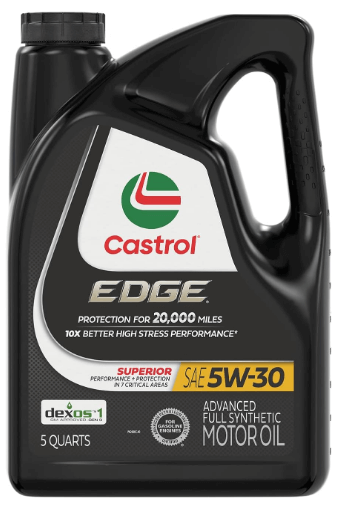
Castrol EDGE is reinforced with Titanium Fluid Strength Technology, making it one of the most durable and high-performing oils on the market.
Features:
- Titanium-based additive boosts oil film strength under pressure.
- Up to 10x better high-temperature performance compared to conventional oils.
- Reduces friction by up to 15% for improved efficiency.
- Offers excellent protection against sludge and deposits.
- Suitable for high-output engines and extended drain intervals.
5. Liqui Moly Synthoil Race Tech GT1 10W-60
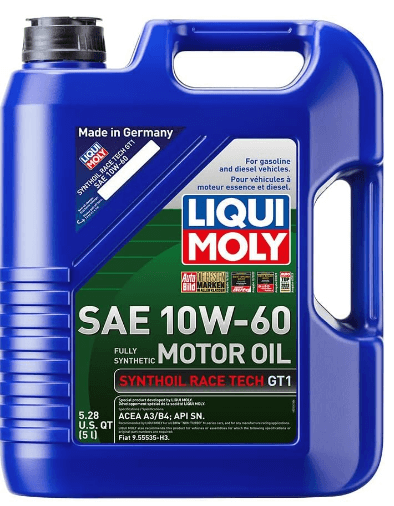
This German-engineered oil is popular in motorsports and is tailored for extreme high-load applications such as track driving and high-performance engines.
Features:
- High-viscosity 10W-60 formulation ideal for high-temperature operation.
- Exceptional shear stability and film strength under load.
- Provides rapid oil delivery during cold starts.
- Reduces oil consumption and maintains pressure in older performance engines.
- Recommended for European high-performance and racing vehicles.
Related Best Motor Oil for Small Engines(Top 5 Best 2025)
Choosing the Right Oil for Your Engine
Here are a few final tips to help you decide which oil best fits your high-performance vehicle:
- Check OEM Recommendations: Always refer to your vehicle’s manual for viscosity and specification requirements.
- Consider Engine Type: Turbocharged, supercharged, or high-compression engines often benefit from full synthetic oils with robust high-temp protection.
- Driving Conditions Matter: If you frequently drive in hot climates or push your engine to its limits, opt for oils with high thermal stability.
- Age of the Engine: Older engines may benefit from slightly higher viscosity oils like 10W-40 or 10W-60 to maintain oil pressure and reduce consumption.
Related Engine Overheating After Oil Change(6 Causes + Solutions)
What Makes a Great High-Performance Engine Oil?
When choosing oil for a high-performance engine, here are the key characteristics to consider:
- High Thermal Stability: The oil should maintain viscosity and protection at high temperatures.
- Superior Lubrication: It should reduce friction and wear under extreme engine loads.
- Robust Detergency: Keeps internal components clean, even under harsh driving conditions.
- Low Volatility: Helps reduce oil burn-off at high RPMs.
- Additive Packages: These should include anti-wear (ZDDP), corrosion inhibitors, and detergents for lasting engine health.
Related Engine Oil With Most Zinc(Top 5 Best 2025)
FAQs
Is thicker oil better for high-performance engines?
Not always. Thicker oil (higher viscosity) can offer better protection under extreme heat and pressure, which may be beneficial in high-performance or older engines. However, too thick oil can reduce fuel efficiency, impede cold starts, and strain the oil pump. Always follow the viscosity grade recommended by your vehicle’s manufacturer.
Which oil is best for performance?
Full synthetic oils like Mobil 1 Extended Performance, Royal Purple High Performance, and Castrol EDGE are widely considered the best for performance due to their superior heat resistance, anti-wear protection, and ability to maintain viscosity under extreme engine stress. Look for oils with strong additive packages and high-temperature stability.
Related Additive To Remove Water From Engine Oil(Top 5 Best 2025)
Which engine oil is best for heavy-duty applications?
For heavy-duty applications such as towing, hauling, or use in trucks and commercial vehicles, oils like Liqui Moly Synthoil GT1 10W-60 or Valvoline Advanced Full Synthetic are great choices. You may also consider diesel-rated oils like Shell Rotella T6 5W-40, which are built to withstand extreme pressure and load.
Which engine oil is better: 10W-40 or 20W-50?
- 10W-40 is better for moderate climates and offers quicker cold starts with good high-temp protection.
- 20W-50 is thicker and better suited for older engines, hot climates, or racing applications.
If your engine is new or manufacturer-recommended for 10W-40, using 20W-50 may be too heavy and reduce performance or cause engine strain.
Can too thick oil damage an engine?
Yes. Using oil that’s too thick can:
- Increase engine drag and reduce efficiency.
- Impede proper flow during cold starts.
- Overwork the oil pump.
- Cause premature wear due to oil starvation in tight-clearance engines.
Stick to the recommended viscosity unless the engine has special requirements.
What are the disadvantages of 20W-50 oil?
- Poor cold start performance: Takes longer to circulate in cold conditions.
- Reduced fuel economy: Higher friction means lower efficiency.
- Not ideal for modern engines: New engines have tighter tolerances that require thinner oils.
- Potential for sludge: In low-temp or short-trip usage, it may not burn off moisture effectively.
Use 20W-50 only if your vehicle specifically requires it or in older, high-mileage, or high-load engines.
Final Thoughts
High-performance engines aren’t just about horsepower, they’re also about reliability and longevity. Choosing a top-tier synthetic oil can make the difference between a smooth-running machine and costly repairs down the road. The five oils listed above are proven performers, delivering exceptional lubrication, cleanliness, and protection where it counts most.

